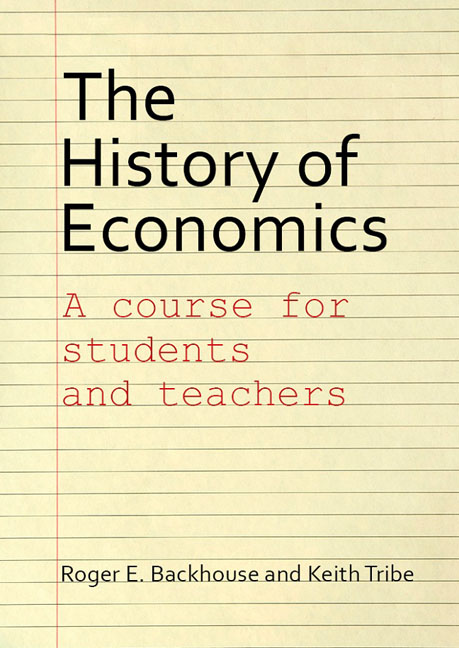Book contents
- Frontmatter
- Contents
- Introduction
- Lecture 1 Commerce, Wealth and Power: The Disputed Foundations of the Strength of a Nation
- Lecture 2 Natural Order, Physiocracy and Reform
- Lecture 3 Adam Smith I: Outline of a Project
- Lecture 4 Adam Smith II: The Two Texts
- Lecture 5 The Political Economy of Malthus and Ricardo
- Lecture 6 Political Economy in Continental Europe and the United States
- Lecture 7 Political Economy, Philosophic Radicalism and John Stuart Mill
- Lecture 8 Popular Political Economy: List, Carey, Bastiat and George
- Lecture 9 Radical Political Economy: Marx and His Sources
- Lecture 10 Marginalism and Subjectivism: Jevons and Edgeworth
- Lecture 11 From Political Economy to Economics
- Lecture 12 Alfred Marshall’s Project
- Lecture 13 Markets and Welfare after Marshall
- Lecture 14 Monetary Economics
- Lecture 15 The Rise of Mathematical Economics
- Lecture 16 Robbins’s Essay and the Definition of Economics
- Lecture 17 John Maynard Keynes
- Lecture 18 Quantitative Economics
- Lecture 19 The Keynesian Revolution
- Lecture 20 Modern Macroeconomics
- Lecture 21 Inflation and the Phillips Curve
- Lecture 22 Popular Economics
- Lecture 23 Economics and Policy
- Lecture 24 Ideology and Place
- Index
Lecture 23 - Economics and Policy
Published online by Cambridge University Press: 09 August 2023
- Frontmatter
- Contents
- Introduction
- Lecture 1 Commerce, Wealth and Power: The Disputed Foundations of the Strength of a Nation
- Lecture 2 Natural Order, Physiocracy and Reform
- Lecture 3 Adam Smith I: Outline of a Project
- Lecture 4 Adam Smith II: The Two Texts
- Lecture 5 The Political Economy of Malthus and Ricardo
- Lecture 6 Political Economy in Continental Europe and the United States
- Lecture 7 Political Economy, Philosophic Radicalism and John Stuart Mill
- Lecture 8 Popular Political Economy: List, Carey, Bastiat and George
- Lecture 9 Radical Political Economy: Marx and His Sources
- Lecture 10 Marginalism and Subjectivism: Jevons and Edgeworth
- Lecture 11 From Political Economy to Economics
- Lecture 12 Alfred Marshall’s Project
- Lecture 13 Markets and Welfare after Marshall
- Lecture 14 Monetary Economics
- Lecture 15 The Rise of Mathematical Economics
- Lecture 16 Robbins’s Essay and the Definition of Economics
- Lecture 17 John Maynard Keynes
- Lecture 18 Quantitative Economics
- Lecture 19 The Keynesian Revolution
- Lecture 20 Modern Macroeconomics
- Lecture 21 Inflation and the Phillips Curve
- Lecture 22 Popular Economics
- Lecture 23 Economics and Policy
- Lecture 24 Ideology and Place
- Index
Summary
Aims of the lecture
1. To show how the relationship of economic ideas to economic policy-making has worked out in practice over the twentieth century.
2. To show the complexity of the relationship between ideas and policy.
3. To place the Keynesian revolution in economic policy in a broader context.
Bibliography
This topic clearly overlaps with lecture 19, on the Keynesian revolution. Material such as that in Hall’s The Political Power of Economic Ideas and Stein’s The Fiscal Revolution in America (details provided in lecture 19) is clearly relevant, as is some material on Keynes in lecture 17. The reading given here steps back from Keynesianism and addresses the problem of policy-making more generally.
M. A. Bernstein’s A Perilous Progress: Economists and Public Purpose in Twentieth-Century America (Princeton, NJ: Princeton University Press, 2001) focuses on the American Economic Association and tells the story of economists’ search for influence on the policy process during the twentieth century, picking out the two world wars as the key events.
W. J. Barber’s From New Era to New Deal: Herbert Hoover, the Economists, and American Economic Policy, 1921–1933 (Cambridge: Cambridge University Press, 1985), which focuses on Herbert Hoover, covers policy-making in the 1920s, showing how the government’s conception of how to manage policy unravelled in 1929. Barber claims that Hoover had a better understanding of the problems that were emerging than did many economists but that his attachment to certain doctrines held him back from effective action. Barber’s Designs within Disorder: Franklin D. Roosevelt, the Economists, and the Shaping of American Economic Policy, 1933–1945 (Cambridge: Cambridge University Press, 1996) gives an account of the many approaches to the problem of the Great Depression and how Roosevelt chose between them.
The generation of statistics, discussed in lecture 18, is highly relevant to the problem of economics and policy. See the references by Duncan and Shelton, Tooze, Stapleford and Vanoli in that lecture.
For international comparative studies of economics in different countries, covering policy-making and academic economics in varying proportions, see the series of volumes edited by A. W. Coats: Economists in Government (Durham, NC: Duke University Press, 1981); The Internationalisation of Economics since 1945, supplement to History of Political Economy, volume 28 (Durham, NC; Duke University Press, 1997); and The Development of Economics in Western Europe (London: Routledge, 2000).
- Type
- Chapter
- Information
- The History of EconomicsA Course for Students and Teachers, pp. 345 - 358Publisher: Agenda PublishingPrint publication year: 2017



